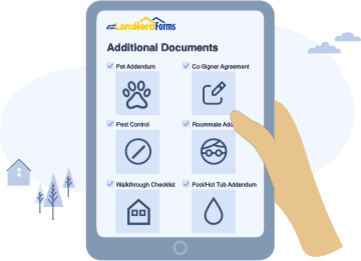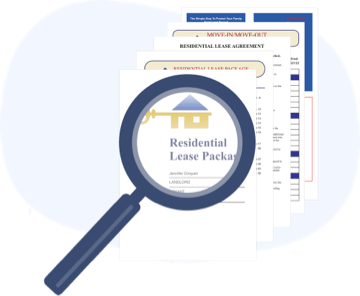Tennessee Lease Agreement with ezSign
Pro Form: Create a Pro Account to access this form
5 Stars
Create and Download the Tennessee Residential Lease & Rental Agreement printable PDF for Landlords. This state-specific Lease is customizable and includes TN laws.
Document Last Modified: 1/30/2024
Document Features
Uses Lease Builder
State-Specific
ezSign
Related Documents
Pro Tip: Have you screened your Tenant? Before signing a Lease Agreement, it’s vital to first screen Tenants to reduce the risk of bad rental outcomes and evictions. Start with our Free Rental Application or Complete Tenant Screening Services.
The Best Online Lease Available.
You won’t find a better Lease Agreement online or one that’s EZier to customize, read, or sign.
A Great Lease that’s EZ to create and use? Classic win-win!
- Over 3 million Leases created since 2006
- Rated “excellent” 4.8 from 5,000+ reviews
- Recommended by Shark Tank’s Barbara Corcoran

Rated “excellent” 4.8 from 5,000+ reviews on Trustpilot
Watch Our Videos
▶ This is Why a Lease is so Important
▶ How to ezSign your Lease Agreement
Video to Share with Tenants
Did we mention it takes less than 15 minutes to create your customized Lease?

Not interested in a Lease but want to make Landlording EZ?
Become a Pro Member or Create a Free AccountTable of Contents
- Tennessee Residential Lease Agreement
- Landlord-Tenant Laws
- Required Disclosures
- FAQs
- Other Popular Forms
- Tennessee Rental Forms and Templates
- Other State Lease Agreements
- Create Your Lease Agreement
Tennessee Residential Lease Agreement

If you rent real estate in Tennessee, you need a Lease Agreement that complies with all Tennessee Lease Laws. Our Tennessee Lease is GUARANTEED to comply with all Tennessee requirements. Plus, it’s EZ to create and customize online in minutes!
- Follow user-friendly prompts to customize your Lease online.
- Get State Assist tips to point out important TN Laws.
- All Tennessee-required language, terms, and disclosures are AUTOMATICALLY included in your Lease Agreement.
- Choose from over 25 addendums and disclosure to customize your Lease Package. For example, a Pet Addendum, a Flood Addendum, or a Pool Addendum.
- Review and sign your Lease Agreement entirely online with ezSign.
Landlord-Tenant Laws
Our Tennessee Lease Agreement is guaranteed to comply with all state Lease Laws. That means you don’t need to worry about Landlord-Tenant laws when creating a Lease.
But, we know that you need to be familiar with these laws when you’re managing your property!
| Category | State Law |
|---|---|
| Ending and Renewing | Month-to-Month: Landlord and Tenant must give at least 30 days’ notice before Lease termination.Fixed Term: The Landlord or Tenant must give the other at least 30 days' notice or notice as specified in the Lease before the termination date. If no notice is given, the Lease ends at the end of the term and the Tenant must vacate |
| Security Deposit | There are no stated regulations regarding the amount that may be charged for a security deposit, but it should be reasonable and held in a separate account. |
| Returned Payment Fee | A fee not to exceed the amount of $30.00 can be charged to the Tenant for a returned check. Tenn. Code Ann. § 47-29-102 |
| Late Fee |
here shall be a five-day grace period between the day the rent was due and the day a late fee may be charged. If the last day of the five-day grace period occurs on a Saturday, Sunday or legal holiday, the Landlord shall not impose any
charge or fee for the late payment of rent, provided that the rent is paid on the next business day. Any charge or fee, however described, which is charged by the Landlord for the late payment of rent shall not exceed ten percent (10%) of the amount of rent past due. |
| Insurance Requirements | Landlords may require tenants to obtain rental insurance. |
| Notice to Enter |
The Tenant shall not unreasonably withhold consent to the Landlord to enter the premises in order to inspect the premises, make necessary or agreed repairs, decorations, alterations, or improvements, supply necessary or agreed services,
or show the premises to prospective or actual purchasers, mortgagees, workers or contractors. The Landlord may enter the property without consent in case of emergency (sudden, generally unexpected occurrence or set of circumstances demanding immediate action). Within the final thirty (30) days of the termination of the Rental Agreement, Landlords must provide 24 hours’ notice to enter premises as long as the right of access for showing is set in the Lease Agreement. |
| Landlord Requirements |
The Tenant shall not unreasonably withhold consent to the Landlord to enter the premises in order to inspect the premises, make necessary or agreed repairs, decorations, alterations, or improvements, supply necessary or agreed services,
or show the premises to prospective or actual purchasers, mortgagees, workers or contractors. The Landlord may enter the property without consent in case of emergency (sudden, generally unexpected occurrence or set of circumstances demanding immediate action). Within the final thirty (30) days of the termination of the Rental Agreement, Landlords must provide 24 hours’ notice to enter premises as long as the right of access for showing is set in the Lease Agreement. |
| Landlord Requirements |
If the Tenant provides an electronic mail address in the rental agreement, any notification required to be sent to the Tenant pursuant to this chapter may be made by the Landlord through electronic notification. The name and address of the owner or agent authorized to manage the premises or any person authorized on the Landlord's behalf shall disclose to the Tenant in writing, at or before the commencement of the tenancy, and shall be kept current throughout the tenancy. |
Contact your local housing or zoning office to be sure your rental property complies with city and county requirements for inspections, rent control, occupancy limits, property codes, and zoning. Many cities and counties require inspections and registrations and have specific maintenance regulations.
Required Disclosures
Tennessee requires that the following disclosures be included in the Lease Agreement. But, don’t worry. We automatically include all required disclosures in our Tennessee Lease Agreement.
Sure makes things EZ, right?
- Address of Landlord or Agent: The Landlord, or lessor, must provide the Tenant, or lessee, with the name and address of the Landlord and all parties authorized to receive notices or manage the property.
- Lead-based Paint Disclosure: Pursuant to federal law, if the rental property was built before 1978, the Landlord must provide renters with a lead-based paint disclosure.
- Showings: If the Landlord wants to have showings in the rental unit up to 30 days before the end of the Lease Term, this must be stated in the Lease Agreement. In addition, Landlords must give occupants twenty-four (24) hours’ notice before showings.


FAQs
Landlords have questions, we’ve got answers! Here are a few of the most popular questions from Tennessee Landlords.
Does a Lease need to be notarized in Tennessee?
No, Tennessee Lease Agreements do not need to be notarized. As long as the Lease is signed by both parties, it’s considered fully executed and legally binding.
Pro Tip: Using an electronic signing tool makes it EZ to get your Lease Agreement signed. Our Tennessee Lease Agreement includes unlimited use of our e-signing tool, ezSign.
What rights do renters and Landlords have in Tennessee?
Renters are entitled to a safe and habitable living environment that is free of retaliation or discrimination. In return, Tenants must pay rent on time and comply with all Lease terms. For more specifics about Landlord and Tenant rights, check out this brochure that summarizes the key points of the Tennessee Landlord-Tenant Act.
How should you store your Lease Agreement?
Your executed Lease Agreement will automatically be stored securely with our ezCloudStorage. In addition, you can download a copy as a PDF to save with your files. Plus, it’s EZ to print if you’d prefer a hard copy.
What is the standard Lease term in Tennessee?
The standard Lease term in Tennessee is one (1) year, but it can be longer or shorter as long as it’s stated in the Lease Agreement. For example, Short-Term Rental Contracts, Vacation Lease Agreements, and Month-to-Month Rental Contracts are all recognized in Tennessee.
Do you need a Lease Agreement in Tennessee?
Yes, anyone that rents real estate should have a Lease Agreement in place before handing over the keys. Once you hand over the keys, your Tenant has legal possession of your property. Should any problems arise with the Tenant, it’s the Lease Agreement that will give you protection.
This is why it’s vital to have a thorough Lease Agreement that is state specific, meaning it complies with all Tennessee laws. Not only is a good Lease often the difference between winning and losing should you ever go to court, but it also often prevents the need for litigation by providing clear guidance that helps avoid and resolve disputes.
Given the importance of the Lease, Landlords should make sure they have a great one. This is true whether you’re renting a single-family home, apartment, condo, or duplex.
There are generic, simple Lease Agreements available online. However, many of these are not state-specific. And, while you can find some fillable, blank Tennessee Lease templates, like the one offered by the Tennessee Association of Realtors, these standard Lease forms won’t cover all terms of your rental property.
Instead, you want a customizable, state-specific Lease Agreement that complies with all state laws and covers all terms of your rental property.
Our Tennessee Lease Agreement provides Landlords with everything they need - and it can be created online in about 15 minutes!
Other Popular Forms
From the application to move-out notices, Landlords need lots of great forms to manage their rental property.
We’ve got over 450 forms to help make Landlording EZ. Plus, we have the state-specific documents that Tennessee Landlords need.
- Rental Application: Our FREE Rental Application makes it EZ to screen Tenants. It gives Landlords key information about Applicants and the required authorizations to run necessary reports, for example, a credit report, criminal history background report, and eviction history report. See sample reports here.
- Move-In/Move-Out Walkthrough Checklist: This Checklist helps Landlords document the condition of the rental property at move-in and move-out.
- Tenant Welcome Letter: Customize this Welcome Letter to share key information about your property with Tenants. It’s the best way to ensure that your new Tenant is ready to take good care of their home from day 1!
- Rent Ledger: Use our free ledger to keep up with rent payments and ensure that you have good documentation should Tenants miss a rent payment.
Tennessee Rental Forms and Templates
- Tennessee 30-Day Notice to Cure or Vacate: This Notice should be used for Tenants that violate the Lease Agreement for non-payment of rent or for other Lease violations. It warns that renters have 14 days to cure the Lease violation. If they do not, they need to vacate or face eviction. This Notice is a necessary first step in the eviction process.
- Tennessee 14-Day Notice to Pay or Vacate: This Notice is for Tenants with unpaid rent. It gives Tenants 14 days to get up to date with rent or face eviction.
- Tennessee 3-Day Notice to Vacate for Dangerous Behavior: This form should be used for Tenants that engage in dangerous criminal activity or other dangerous activities that put other Tenants, neighbors, or the property at risk.
- Tennessee 7-Day Notice to Vacate: This form should be used for Tenants that have already received a Notice to Cure a Lease Violation or for Tenants that have violated the Lease Agreement for the second time within 6 months.
- Tennessee Landlord and Tenant Act Consumer Information: This resource summarizes key aspects of the TN Landlord-Tenant Act and outlines the rights of Landlords and Tenants.
Don’t see the form you need? Search our complete library of over 450 forms!
When an issue arises, it’s good to know you’ve got the right form to deal with it.
Other State Lease Agreements
If you have rental properties in multiple states, you need a state-specific Lease Agreement for each of them. Good news: we’ve got them all!
Here are some used the most by Tennessee Landlords!
- Alabama Residential Lease Agreement: Create the complete Alabama Lease Package online in minutes.
- Arkansas Rental Contract: Customize your Arkansas Lease by adding additional terms or addendums with just the click of a button.
- Georgia Lease Agreement: The EZ way to comply with all Georgia Lease laws!
- Kentucky Residential Rental Contract: Our KY Lease complies with all state laws AND all the Lease requirements of Louisville and Lexington.
- Mississippi Rental Contract: Our Mississippi Lease Agreement includes unlimited access to our electronic signing tool, ezSign.
- Missouri Residential Lease Contract: Complies with all Lease requirements for Kansas City and St. Louis!
- North Carolina Lease Agreement: Create a complete North Carolina Lease Package in minutes!
- North Carolina Lease Agreement: Guaranteed to comply with Virginia’s Landlord-Tenant laws.

Create Your Lease Agreement
Ready to build a great Lease Agreement?
- Fully customize your Tennessee Lease online in minutes.
- Guaranteed to comply with all Tennessee Lease Laws.
- Includes unlimited access to our electronic signing and electronic storage tools.
Yep, it’s that EZ.
